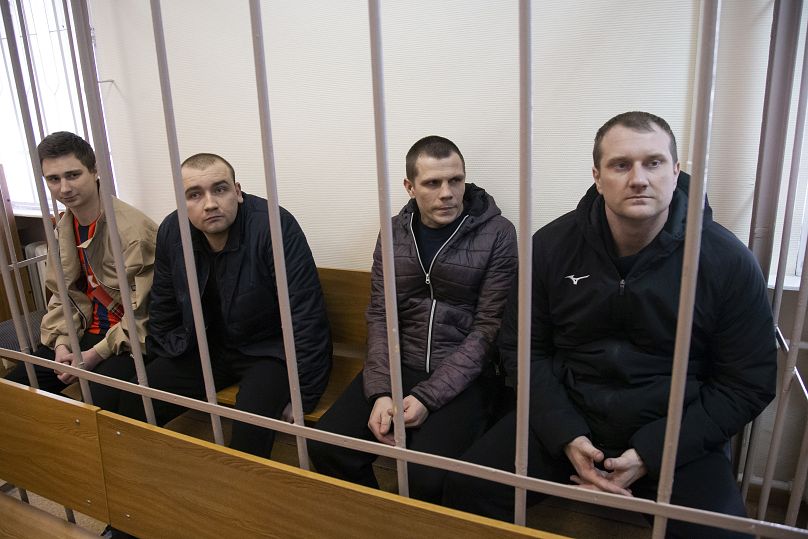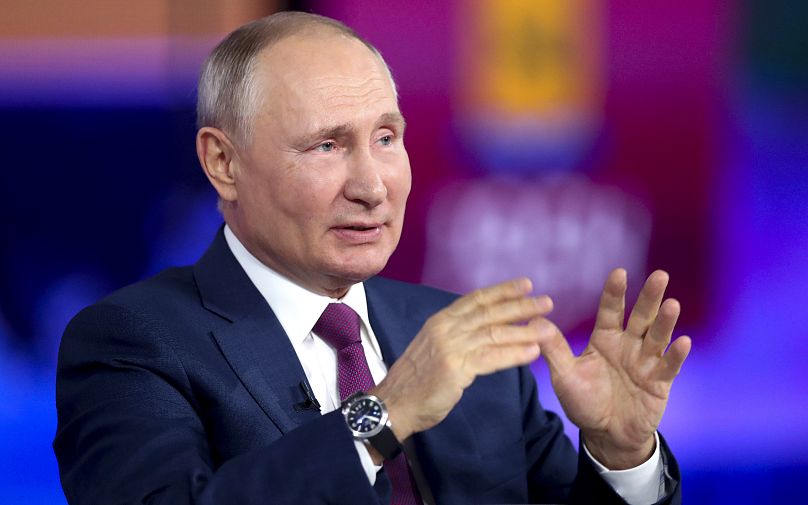Western nations shouldn't shy away from tit-for-tat moves when Russia breaks maritime laws, a foreign policy expert told Euronews after a series of naval incidents in the Black Sea.
The Black Sea has seen frequent and close confrontation between Russian and Western military forces in recent weeks.
 ADVERTISEMENT
ADVERTISEMENT
 ADVERTISEMENT
ADVERTISEMENT
In a major incident in late June, Russia said one of its warships fired warning shots and a warplane dropped bombs to force a British destroyer out of an area near Crimea that Moscow claims as its territorial waters. London denied that account and insisted its ship wasn’t fired upon.
Just a day later, Russian warplanes repeatedly flew low over a Dutch navy frigate and conducted “mock attacks,” the Defence Ministry of the Netherlands said.
A new wave of incidents was reported this week as the US and Ukraine lead a NATO military drill in the Black Sea known as "Sea Breeze" with more than 30 countries.
So what is Russia's endgame in the Black Sea and how dangerous could the muscle-flexing get?
Euronews spoke to a foreign policy expert to find out what was behind the recent series of confrontations in the strategic Black Sea.
'It's about Crimea'
Gustav Gressel, a Senior Policy Fellow at the Wider Europe Programme of the European Council on Foreign Relations (ECFR) told Euronews that Russia's recent moves were a way to assert its sovereignty over Crimea.
"The first thing is, of course, Russia considers Crimea Russian and it wants the West to recognise Crimea as such," the expert told Euronews.
Moscow annexed Ukraine’s Crimean Peninsula in 2014, a move not recognised by most countries.
"The second thing is that Russia does not want to have any NATO military presence in the Black Sea and they're aggressively harassing any Western ship that comes in, not only close to Crimea, but also in international waters," Gressel added.
Russia said on Wednesday that it was tracking a Spanish naval ship in the Black Sea on its way to take part in Sea Breeze.
"When they captured Crimea, the Russians also captured a lot of oil rigs and gas drilling installations in the Black Sea, which reach up to the Romanian shore," Gressel went on, "and they are very aggressively policing them."
"That gives them basically a position to cut off Ukraine entirely from maritime traffic if they want to."
Why now?
Gressel noted there were precedents, notably in 2018 when Moscow seized Ukrainian naval ships and their crews near the Kerch Strait that connects the Black Sea with the Azov Sea.
Russia claimed the Ukrainian ships had violated procedures for transiting the strait, while the Ukrainians said they were travelling in international waters.
The Russian coast guard fired shots, then seized the ships and their crew of 24 Ukrainian sailors. The sailors were detained for 10 months and before returning home as part of a prisoner exchange.
"The 2018 Kerch Strait incident was actually quite severe but the victim was Ukraine," Gressel said-- not a major Western European power.
In April this year, Russia declared exclusion zones off Crimea for six months, closing the area to foreign naval ships.
Gressel told Euronews that the move didn't serve the purpose exclusion zones were designed for in international law and were just there to "put arbitrary pressure" while harming Ukraine's ability to export its agricultural production this summer.
The decision drew strong complaints from Ukraine and Western nations but Moscow rejected the criticism and said the restrictions wouldn’t interfere with commercial shipping.
The incident with the British naval ship last month took place in one of the exclusion zones, while the Dutch ship came close to one.
West being 'too nice'
In all these incidents, the expert told Euronews, "you see the Russians pushing and they see how we react. And if there is no serious counteraction, they push further and they get more aggressive."
"They got more confident over the past years that this kind of stuff is accepted," he added.
Western nations' reactions mostly consisted in "protests and protest notes," Gressel told Euronews.
"I think the most important thing is to show the Russians that you won't back down because of this. And you sort of repeat the exercise, and still continue to have drills with the Ukrainians, you still go into the Black Sea."
The expert told Euronews that the West should respond with "tit for tat" moves when Russia breaks maritime laws.
"Russia is openly violating international maritime law but on the other hand, it adamantly expects that this law be respected by European nations when Russian vessels, for example, (...) pass the English channel or when the Russian fleet is weathering a big North Atlantic storm in protected British space," he said.
"We don't have to be nice. We don't have to refuel your aircraft carrier in safe Spanish waters if you're playing this way," the expert went on.
He noted however that this tougher approach was "in its very infancy" among Europeans. "It's not widely agreed, at least amongst politicians, how you should play this," Gressel said.
Moscow denounces Western 'provocation'
Asked about the incident with Britain’s HMS Defender, Russian President Vladimir Putin denounced a “provocation” to test Russia’s response.
“It was clearly a provocation, a complex one involving not only the British but also the Americans,” he said in a live call-in show last week.
Putin claimed that a US reconnaissance aircraft was operating in concert with the British ship on an apparent mission to monitor the Russian military’s response to the UK's destroyer.
The Pentagon acknowledged that it had an aircraft in operation. “We are operating in and watching everything in the Black Sea region, as we always do,” a US official said.
But Putin insisted the recent naval incident took the row over Crimea's annexation to a new level.
“They don’t recognise something — OK, they can keep refusing to recognise it,” he said. “But why conduct such provocations?”
“We are fighting for ourselves and our future on our own territory,” he said. “It’s not us who travelled thousands of kilometres to come to them; it’s them who have come to our borders and violated our territorial waters,” the Russian President told the show.
"Even if we had sunk that ship, it would be hard to imagine that it would put the world on the brink of World War III because those who do it know that they can’t emerge as winners in that war, and it’s very important,” Putin said.
The comments followed Russian officials’ warning that if a Western warship entered the waters again, the military could fire on it.
'No WW III coming from Black Sea'
On the possibility that the incidents between naval ships could further escalate, Gressel said: "That very well depends on who the Navy is."
"What I heard from sailors of the US Navy is that their incident management agreements with the Russians still works."
"It's more of a grey zone when it comes to other navies, whether the Russians feel bolder to do stupid things and feel there is less risk involved in infringing upon their movements."
"Otherwise I don't see World War III coming out of these incidents. These are statements delivered by warships on different territorial claims, but there yet they're all statements," Gressel said on a more reassuring note.
"You can see with the [British] Defender how cautious the Russians were despite propagandising that they have been throwing bombs and shooting across the bow, etc. They have been shooting in a very distant manner and they did not engage in something extremely dangerous with regard to the West. "
"The British have been prepared and they have flagged their preparedness to the Russians, and that has sufficiently deterred them," the foreign policy expert added.
"So I think with the current set of incidents, we are of course not in a comfort zone, we are not in good relations, but we are within the margins of controllability," Gressel concluded.












